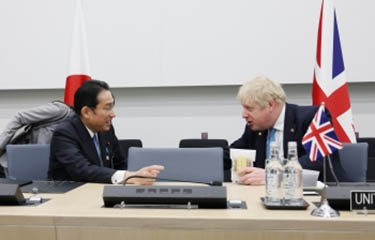The United Kingdom officially lifted import restrictions on Japanese food products related to radionuclides on 29 June, 2022.
The restrictions on products were introduced after the 2011 disaster at the Fukushima Daiichi Nuclear Power Station operated by the Tokyo Electric Power Company (TEPCO), which released radiation into the surrounding environment after the East Japan Earthquake.
The restrictions were originally introduced as a European Union regulation, but the U.K. decided to continue applying them even after Brexit.
The E.U. regulations require foods and feed originating in the nine prefectures of Fukushima – Miyagi, Yamagata, Ibaraki, Gunma, Niigata, Yamanashi, Nagano, and Shizuoka – to be tested in Japan and certified to have below the Japanese established limit of 100 Becquerels-per-kilogram of radiocesium (the radioactive form of cesium). Shipments have to be accompanied by the official certificate.
The U.K.'s removal of that requirement in view of the scientific opinion that even if foods containing cesium over that limit were ingested, it would not be dangerous to health at typical levels of consumption.
“The government of Japan has strongly urged the U.K. government to lift the restrictions through various opportunities, including the Japan-U.K. summit meeting in May this year,” Japan’s Ministry of Foreign Affairs said in a press release. “The government of Japan welcomes the fact that the U.K. government reached this decision based on scientific evidence, as it will support the reconstruction of the affected areas. The government of Japan will continue to work towards the early lifting of the remaining import restrictions in the E.U. and other countries and regions.”
On 25 June, similar regulations were passed by the Scottish parliament and came into force. As a result, import restrictions have been removed throughout the U.K. with the exception of Northern Ireland, where E.U. rules continue to apply under agreements between the U.K. and the E.U.
The U.K. imported about USD 9.19 million (EUR 8.7 million) worth of fish, crustaceans, mollusks, and aquatic invertebrates from Japan in 2021. Though the volume of Japan’s food exports to the U.K. is small – mostly consisting of items sold in Japanese restaurants – the action adds momentum and pressure to Japan’s requests to other countries to similarly lift restrictions. After the 2011 Fukushima Daiichi Nuclear Power Station accident, 55 countries and regions introduced import restrictions on Japanese food products. With the change in regulation in the U.K., the number of countries and regions that maintain restrictions has decreased to 13.
The current status of countries and regions that introduced import measures on Japanese food after the TEPCO Fukushima Daiichi Nuclear Power Station accident shows that 42 of these have lifted all measures. Five – China, South Korea, Taiwan, Hong Kong, and Macau – retain an import ban. In February, Taiwan lifted restrictions on most products from five prefectures, and relaxed certificate requirements on imports from other prefectures. There are eight countries or regions that maintain some test certificate requirements: the E.U. (including Northern Ireland), the members of the European Free Trade Association (Iceland, Liechtenstein, Norway, and Switzerland), French Polynesia, Russia, and Indonesia.
Photo courtesy of Japan's Ministry of Foreign Affairs







